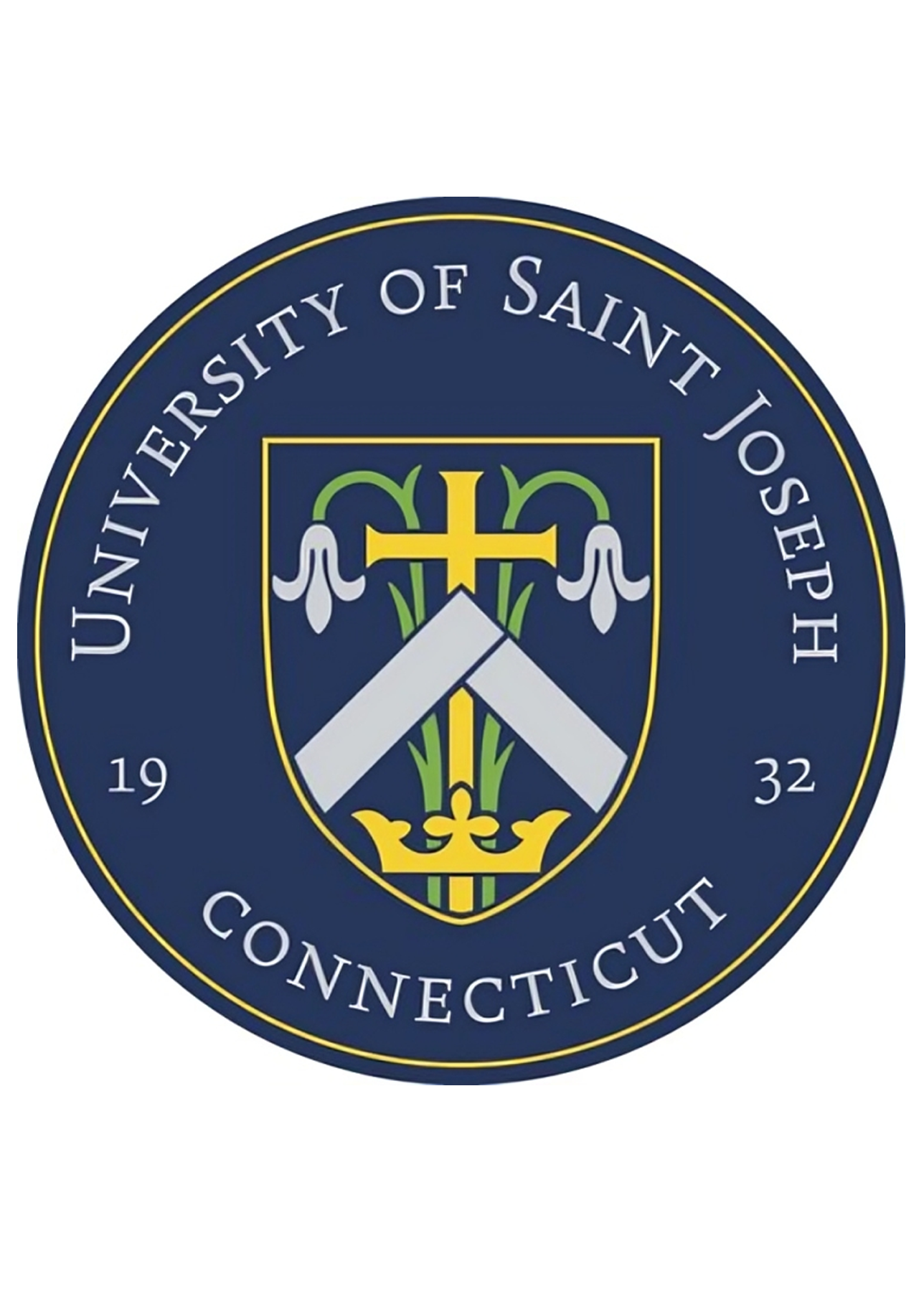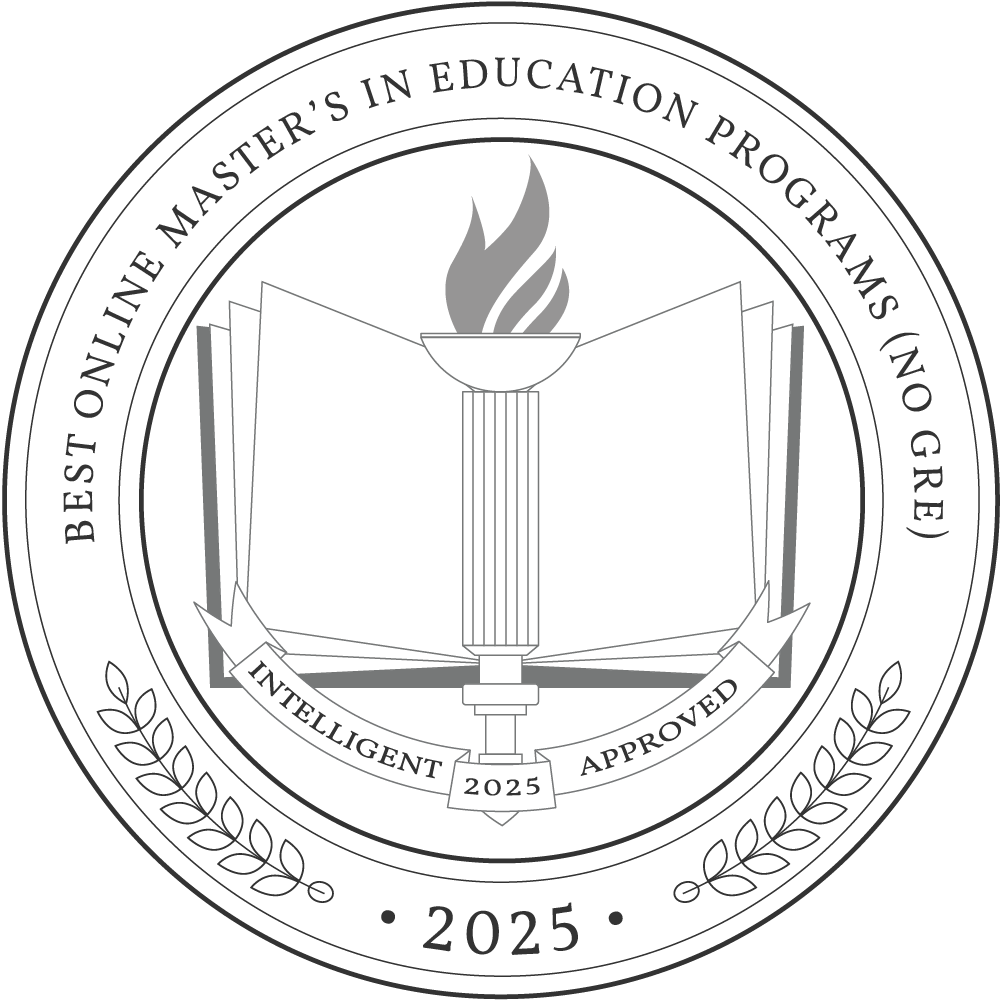For current or aspiring educators seeking to level up their careers with a master’s in education without the GRE requirement, this page is an excellent place to start your research. These programs are designed for those who prefer assessment through other metrics like undergraduate GPA, work experience, and personal statements — offering the same high-quality education as their traditional counterparts.
Graduates often pursue leadership roles, such as school principal or administrator, with a median salary of $103,460. Others find opportunities in instructional design, earning a median salary of $74,620. Many continue teaching, where a master’s degree can lead to higher pay, with the top 10% of high school teachers earning $106,380.
Online programs offer flexibility, allowing part-time students to complete their degrees in two to three years and full-time students in 18 months to two years, making it easier for working professionals to advance their education and careers.
Why Trust Us
The Intelligent.com Higher Education Team is dedicated to providing students with independent, equitable school and program rankings and well-researched resources. Our expert-driven articles cover topics related to online colleges and programs, paying for school, and career outlooks. We use data from the U.S. Department of Education’s College Scorecard, the National Center for Education Statistics, and other reputable educational and professional organizations. Our academic advisory team reviews content and verifies accuracy throughout the year for the most current information. Partnerships do not influence rankings or editorial decisions.
- Analyzed over 2,000 national, accredited, and nonprofit colleges and universities
- 800+ rankings pages are reviewed and updated yearly
- Content is informed by reputable sources, surveys, and interviews with academic advisors and other experts
- Over 100 data points are reviewed for accuracy and quality throughout the year, including sources
How we rank schools
Our list features the best online Educational Programs (NO GRE) degree at top colleges nationwide. Each school featured is a nonprofit, accredited institution — either public or private — with a high standard of academic quality for post-secondary institutions.
We evaluated each school’s program on tuition costs, admission, retention and graduation rates, faculty, reputation, and the student resources provided for online students. We collected data from trusted sources like the National Center for Education Statistics, individual school and program websites, school admissions counselors, and other data sources. Then, we calculated the Intelligent Score on a scale of 0 to 100 based on the following criterion:
Academic Quality:
- Admission rate versus enrollment rate
- Retention rate of students who return after year one
- Accreditation status (regional and programmatic)
- Nonprofit status, both private and public institutions
Graduation Rate
- Overall graduation rate
- Total number of currently enrolled students, including diversity metrics
- Student-to-faculty ratio
Cost and ROI
- In-state and out-of-state per-credit tuition rates and fees
- Required credits to graduate
- Earning potential after graduation
- Availability of federal student loans, scholarships, and other financial aid options
Student Resources
- Available student services for online-only and hybrid programs
- On-campus amenities like tutoring centers and the number of libraries
Read more about our ranking methodology.
Best 29 Accredited Online Master's in Education Programs (No GRE)
FiltersInstitution Type
Status
- Intelligent Score
- Alphabetically By University Name
- Acceptance Rate
- Enrollment
- In-state Graduate Tuition
- Out-of-state Graduate Tuition
- In-state Undergraduate Tuition
- Out-of-state Undergraduate Tuition

North Carolina State University
Intelligent Score: 99.09In-state: $6,535
Out-of-state: $26,654
In-state: $9,095
Out-of-state: $9,095
SAT: 1230-1410
ACT: 27-32
Resident: $547
Non-Resident: $1,701
Online, On-Campus
Council for the Accreditation of Educator Preparation
30

University of Kansas
Intelligent Score: 98.37In-state: $10,092
Out-of-state: $26,960
In-state: $9,989
Out-of-state: $9,989
SAT: 1070-1320
ACT: 22-29
$595
Online
Council for the Accreditation of Educator Preparation
36

Ball State University
Intelligent Score: 97.04In-state: $9,482
Out-of-state: $26,470
In-state: $9,328
Out-of-state: $9,328
SAT: N/A
ACT: N/A
In-State: $464
Out-of-State: $696
Online
Council for the Accreditation of Educator Preparation
30

University of Cincinnati
Intelligent Score: 96.82In-state: $9,723
Out-of-state: $25,057
In-state: $13,224
Out-of-state: $13,224
SAT: 1120-1330
ACT: 23-29
$662
Online
Higher Learning Commission
30

Saint Joseph’s University
Intelligent Score: 95.93In-state: $39,636
Out-of-state: $39,636
In-state: $14,328
Out-of-state: $14,328
SAT: 970-1170
ACT: 22-24
$862
Online
Middle States Commission on Higher Education
30-31

Texas Tech University
Intelligent Score: 94.51In-state: $8,683
Out-of-state: $20,953
In-state: $6,788
Out-of-state: $6,788
SAT: 1070-1240
ACT: 22-27
Resident: $313
Non-Resident: $723
Online
Southern Association of Colleges and Schools Commission on Colleges
36

University of Dayton
Intelligent Score: 93.99In-state: $44,890
Out-of-state: $44,890
In-state: $17,730
Out-of-state: $17,730
SAT: 1080-1300
ACT: 23-29
$1,165
Online
Higher Learning Commission
30-42

George Washington University
Intelligent Score: 93.09In-state: $55,961
Out-of-state: $55,961
In-state: $31,770
Out-of-state: $31,770
SAT: 1270-1450
ACT: 30-33
$970
Online, On-Campus
Council for the Accreditation of Educator Preparation
30-36

University of Illinois at Urbana - Champaign
Intelligent Score: 90.7In-state: $14,317
Out-of-state: $33,824
In-state: $15,016
Out-of-state: $15,016
SAT: 1200-1460
ACT: 27-33
$520
Online
Higher Learning Commission
32

University of Iowa
Intelligent Score: 88.64In-state: $8,073
Out-of-state: $30,036
In-state: $10,079
Out-of-state: $10,079
SAT: 1110-1310
ACT: 22-29
$595
Online
Higher Learning Commission
36

University of San Diego
Intelligent Score: 87.99In-state: $52,120
Out-of-state: $52,120
In-state: $27,936
Out-of-state: $27,936
SAT: N/A
ACT: N/A
$710
Online
Western Association of Schools and Colleges Senior College and University Commission
30

Emporia State University
Intelligent Score: 87.04In-state: $5,278
Out-of-state: $19,522
In-state: $6,547
Out-of-state: $6,547
SAT: N/A
ACT: N/A
$332
Online
Council for the Accreditation of Educator Preparation
33

Western Governors University
Intelligent Score: 86.68In-state: $6,380
Out-of-state: $6,380
In-state: $7,500
Out-of-state: $7,500
SAT: N/A
ACT: N/A
$408 - $530
Online
Northwest Commission on Colleges and Universities
30-39

University of Arkansas
Intelligent Score: 84.88In-state: $7,568
Out-of-state: $24,056
In-state: $7,752
Out-of-state: $7,752
SAT: 1090-1280
ACT: 23-29
$438
Online
Council for the Accreditation of Educator Preparation
30

Western Carolina University
Intelligent Score: 84.44In-state: $1,000
Out-of-state: $5,000
In-state: $4,435
Out-of-state: $4,435
SAT: 1020-1220
ACT: 20-25
In-State: $254
Out-of-State: $849
Online
Southern Association of Colleges and Schools Commission on Colleges
30-33

University at Buffalo
Intelligent Score: 81.58In-state: $7,070
Out-of-state: $24,740
In-state: $11,310
Out-of-state: $11,310
SAT: 1140-1310
ACT: 23-29
Resident: $471
Non-Resident: $565
Online, On-Campus
Middle States Commission on Higher Education
30-33

University of Michigan-Flint
Intelligent Score: 81.07In-state: $16,520
Out-of-state: $53,669
In-state: $24,344
Out-of-state: $24,344
SAT: 1340-1520
ACT: 31-34
In-State: $772
Out-of-State: $1,156
Online
Council for the Accreditation of Educator Preparation
30

Lamar University
Intelligent Score: 80.76In-state: $6,129
Out-of-state: $15,945
In-state: $6,397
Out-of-state: $6,397
SAT: 943-1140
ACT: 17-23
$342
Online
Southern Association of Colleges and Schools Commission on Colleges
36
How to Choose an Online Master’s in Education Program (No GRE)
Choose a specialization
A master’s in education is a relatively versatile degree, with most programs offering different areas of study, career tracks, or specializations to help you tailor your education to your future career. By choosing one, you’ll be better prepared for your intended career and, ultimately, a more competitive hire.
For example, specializations like educational leadership suit aspiring principals or administrators, while curriculum and instruction is ideal for those wanting to improve teaching methods. Special education focuses on supporting students with disabilities, and educational technology is perfect for those interested in integrating tech into learning environments.
Research schools and programs
Focusing on your chosen specialization, begin looking into different schools and programs. You may already have a few questions in mind, but here are some more to help you guide your research:
- What are the faculty’s credentials and previous experience in your area of study?
- Are there opportunities for practical experience or internships?
- What support services are available for online students?
Most of this information is readily available on program websites, but you’ll also benefit from attending an information session or reaching out to an admissions counselor.
Prepare for tests and applications
With your shortlist of programs in hand, you can turn your attention to test and application prep. This process may vary depending on the program, but most share a standard process involving:
- Gathering all previous academic transcripts
- Obtaining letters of recommendation from mentors or employers
- Preparing a resume illustrating your relevant experience
- Writing your personal statement or statement of purpose
Since these programs don’t require the GRE, admissions will emphasize your GPA, work experience, and personal statement. Focus on presenting a strong, well-rounded application to illustrate your qualifications.
Select your program
Once acceptance letters arrive, revisit your initial research criteria to choose the right program. Focus on what matters most to you, such as the faculty you’ll learn from, curriculum relevance, and support services for online learners. Then, reassess the total cost of attendance, factoring in tuition, fees, and other expenses, and compare this to any financial aid offers.
Determine how you’ll pay for your degree
For most students, funding your degree without incurring substantial debt is a top priority. Start by filing your FAFSA to determine your federal financial aid eligibility. Then, explore scholarships and grants, as they provide funding without the need for repayment.
If you’re seeking part-time work, consider assistantships to help offset costs. For those currently employed in education or a related field, check if your employer offers tuition reimbursement programs. Lastly, opt for federal loans over personal loans due to better terms and protections — but be sure to use these only as a last resort, as every dollar taken out on a loan will eventually need to be repaid with interest.
What Can You Expect From an Online Master’s in Education Program (No GRE)?
For students wanting to avoid standardized testing or those simply wishing to be assessed on other metrics, an online master’s in education program that forgoes the traditional GRE offers a more accessible pathway to career advancement. Aspiring educators and current teachers looking to advance their careers can expect a curriculum to improve their knowledge and skills in educational theory, instructional strategies, and leadership principles.
While many programs require the completion of a thesis to demonstrate mastery of the subject, some online master’s in education programs offer non-thesis tracks. These alternatives might include capstone projects, comprehensive exams, or practicum experiences, allowing you to complete this degree in different ways.
It often takes 18 months to two years of full-time study to complete these programs, depending on your pace and course load. Those with part-time enrollment will likely take three to four years to graduate.
Potential courses you’ll take in an online master’s in education program
- Foundation of Curriculum and Instruction: Likely one of the first courses you’ll take, this class explores the fundamental principles of curriculum design and instructional strategies. Students learn to develop effective lesson plans, align curriculum with education standards, and assess student learning outcomes while emphasizing how to create engaging and meaningful educational experiences.
- Multicultural Education: Another foundational course in most curriculums, this class focuses on the importance of cultural diversity in the classroom. Additionally, many courses of this nature cover strategies for creating an inclusive learning environment and fostering a culturally responsive curriculum that supports all students.
- Constructivist Learning Technologies: In this course, students will examine the role of technology in supporting constructivist learning theories. Participants explore digital tools and platforms that promote active learning, collaboration, and critical thinking, emphasizing designing technology-rich learning environments.
How To Succeed in an Online Master’s in Education Program
If you have decided that pursuing an online degree is the right choice for you, here are some tips to help you overcome the inherent challenges and succeed in your studies:
- Develop a routine and commit to it: Set aside daily or weekly dedicated study time and create a schedule that works for you. This will help you stay on track and make progress toward your degree, even without the built-in accountability of traditional programs.
- Stay organized: Use calendars, to-do lists, and productivity apps to stay organized and manage your time effectively. This will help you avoid procrastination and stay focused on your goals.
- Take advantage of remote student services: Many online programs offer remote student services, such as virtual tutoring and career counseling. Regularly take advantage of these resources to get your support to succeed.
- Participate in virtual office hours and online discussions: Online programs often have virtual office hours and classroom discussions that allow you to connect with your instructors and peers. Participating in these can help you stay engaged and get your questions answered.
- Practice effective self-studying: To be successful in an online program, you need to be a self-starter and motivated learner. Take advantage of online resources such as recorded lectures, quizzes, and interactive exercises to help you learn more effectively.
- Stay connected with your peers: Connect with other students in your program through online discussion forums or social media groups. By creating a community of your peers, you can stay motivated and build a support system as you pursue your degree.
By following these types, you can overcome the challenges of earning your degree online and achieve your academic and career goals. Remember, success in an online program requires discipline, organization, and a willingness to be a self-motivated learner.
What Can I Do With a Master’s in Education Degree?
Many graduates go on to pursue careers in educational leadership or administration, where demand is steady, and thousands of jobs are expected to be added every year. Still, others may continue as teachers, where a graduate degree may lead to a higher salary, with the top 10% of high school teachers earning upwards of $106,380.
Career outlook
- Elementary, Middle, or High School Principal — Many graduates who focus on educational leadership pursue roles as principals. These professionals oversee a school’s daily operations, ensuring a safe and effective learning environment.
- Median annual salary: $103,460
- Projected employment growth (through 2032): 1%
- New jobs projected: 20,200
- Instructional Coordinator — Graduates in this role develop and implement curriculum and instructional materials. They work closely with teachers and school administrators to improve teaching practices and student learning outcomes through educational programs.
- Median annual salary: $74,620
- Projected employment growth (through 2032): 2%
- New jobs projected: 19,200
- Registrar — Registrars manage student records and the enrollment process at an educational institution, providing accurate and secure maintenance of academic records. They may oversee course registration, transcript preparation, and compliance with institutional and governmental regulations.
- Median annual salary: $102,610
- Projected employment growth (through 2032): 4%
- New jobs projected: 15,300
Online Master’s in Education Degree (No GRE) Frequently Asked Questions
How do degree programs with no GRE requirement work?
Degree programs that don’t have a GRE requirement admit students by placing a greater emphasis on other elements of the application, such as undergraduate GPA, previous work experience, and personal statements. These factors often represent an applicant’s readiness and potential for success, just as a standardized test does. It’s important to note that the curriculum remains virtually the same, maintaining high academic standards and thorough coursework.
To explore the pros and cons of these programs and determine if they’re the right fit for you, visit this page, which goes into more detail.
How long does it take to earn an online master's in education degree?
The timeline to earn this degree online typically ranges from 18 months to two years for full-time students, while part-time students may take three to four years. The absence of a GRE requirement doesn’t affect these completion times; however, the total number of required credits, which varies by program, can impact the duration. You’ll want to carefully review the credit requirements before enrolling to plan your schedule effectively.
How much does an online master's in education degree cost?
According to the National Center for Education Statistics, the average annual cost of graduate-level tuition is $20,513. However, it’s important to note that tuition alone doesn’t cover every cost. Online learners, in particular, are likely to encounter technology, library fees, and other expenses that other students regularly see, like textbooks and course materials.

